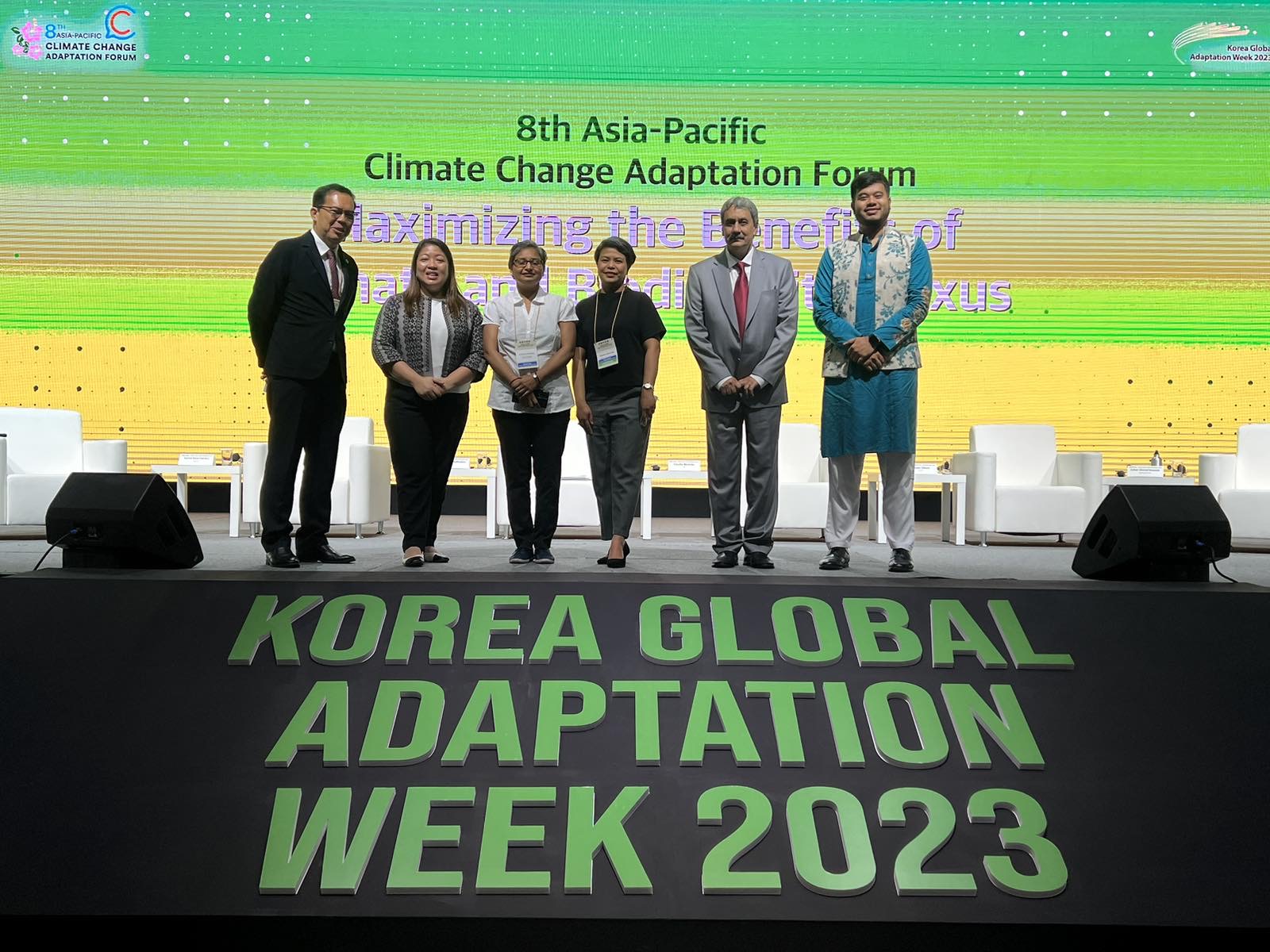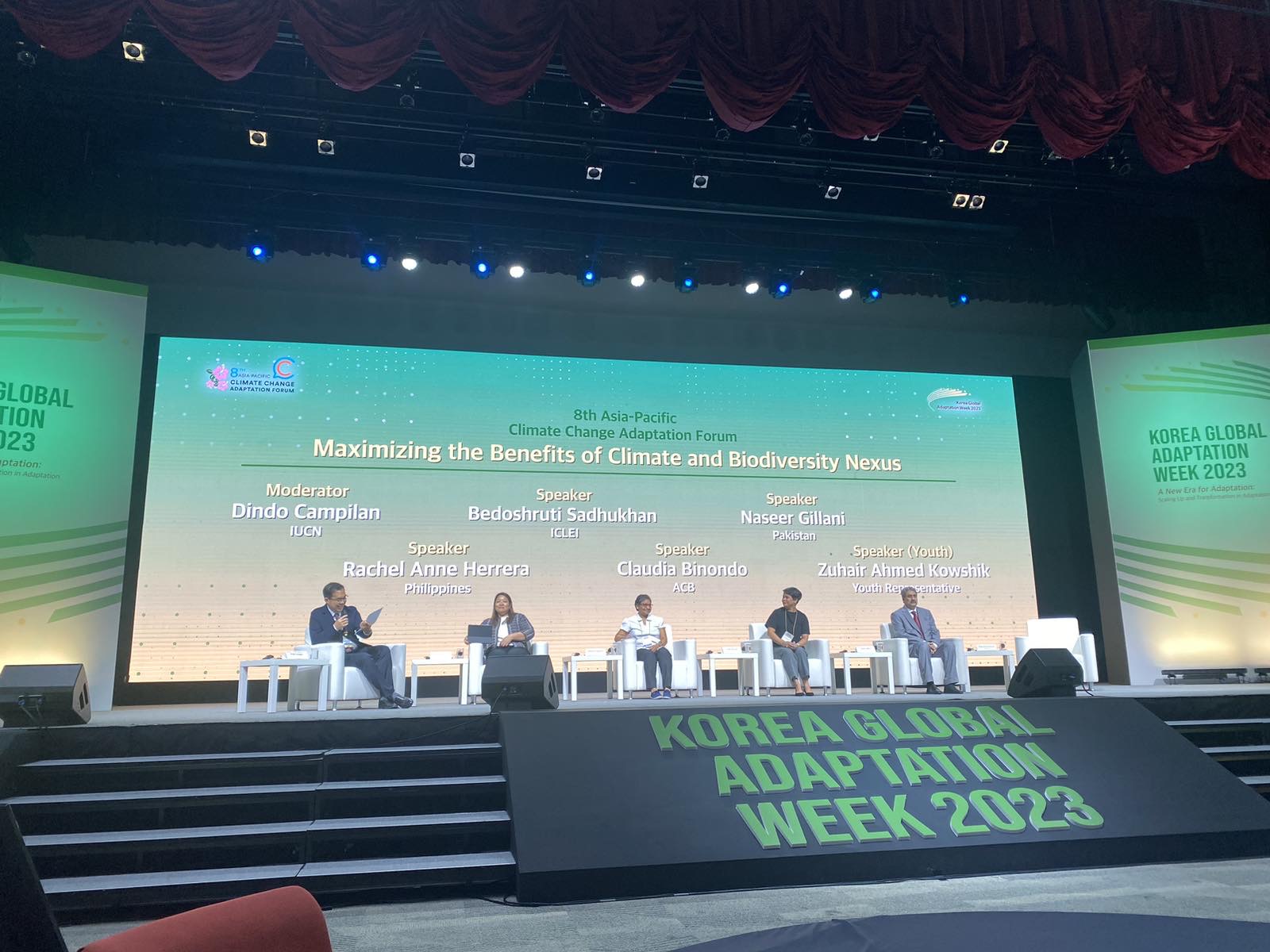
September 01, 2023 Friday

From left to right: Mr. Dindo Campilan, IUCN Regional Director for Asia and Oceania Hub; Climate Change Commission Commissioner Rachel Anne S. Herrera; Ms. Bedoshruti Sadhukhan, ICLEI South Asia Senior Programme Coordinator; Ms. Claudia Binondo, ASEAN Centre for Biodiversity Project Development Director; Mr. Naseer Gillani, Planning Commission, Pakistan Institute of Development Economics, Chair, Development Finance SDGs; and Mr. Zuhair Ahmed Kowshik, Children and Youth Major Group to UNEP, Global Focal Point

Incheon, South Korea, 1 September 2023 — The Climate Change Commission (CCC) underscored the need to optimize efforts addressing interrelated issues of climate change and biodiversity during the 8th Asia-Pacific Climate Change Adaptation Forum Third Plenary Discussion held on 31 August 2023 in Incheon, Republic of Korea.
The Philippines is one of the world’s megadiverse countries, housing 70-80% of the world’s animal and plant species and accounting for two-thirds of the world’s biodiversity, but it is also considered a biodiversity hotspot. Conserving and restoring natural spaces on land and in water is crucial to curbing emissions and adapting to a changing climate.
“Environmental protection and climate action are among the top priorities of the Philippine government, and we have a wealth of policies that reflect this agenda,” CCC Commissioner Rachel Anne S. Herrera said during the plenary session on Maximizing the Benefits of the Climate and Biodiversity Nexus. “We recognized early on, due to losses and damage from climate linked disasters, that the work to address climate change strikes across many governmental functions. Consequently, in 2011, we created our Cabinet Cluster on Climate Change Adaptation and Mitigation and Disaster Risk Reduction (CCAM-DRR) to serve as the main coordination mechanism for government agencies to incorporate climate and disaster risks in government programming,” Herrera explained.
Through this Cluster, a program convergence budgeting and planning approach was developed as an innovative way to enable government agencies to move as one and optimize impacts on projects and programs. This has given birth to the flagship program called the Risk Resiliency and Sustainability Program (RRSP), which aims to deliver adaptation outcomes and strengthen the resilience of natural ecosystems.
Climate-vulnerable areas in the Philippines, which are highly susceptible to hazards, situated in critical watersheds, and with high poverty incidence, were able to develop resilience roadmaps under the RRSP. These roadmaps, with investment portfolios for risk resilience, incorporated ecosystem and biodiversity protection and participation from local stakeholders. The program investment areas include integrated water resource management, coastal protection, community livelihood, seismic resiliency, and climate information services.
Joining Herrera in the discussion are Ms. Bedoshruti Sadhukhan, International Council for Local Environmental Initiatives (ICLEI) South Asia Senior Programme Coordinator; Ms. Claudia Binondo, ASEAN Centre for Biodiversity Project Development Director; Mr. Naseer Gillani, Pakistan Institute of Development Economics, Chairperson on Development Finance and Sustainable Development Goals (SDGs); and Mr. Zuhair Ahmed Kowshik, Children and Youth Major Group to United Nations Environment Programme (UNEP), Global Focal Point. The session was moderated by Dr. Dindo Campilan, International Union for Conservation of Nature (IUCN) Regional Director for Asia and Oceania.
The session highlighted the value of ecosystem-based adaptation and nature-based solutions in supporting both adaptation and the restoration of ecosystem services. These issues are recommended to be undertaken together in global agendas, national strategies, and local actions.
“We’re seeing more and more initiatives on the nexus to maximize the multiple co-benefits. Solutions that promote collaboration and produce benefits to a range of concerns can optimize the very limited resources that we have now compared to what is needed to adapt. We have to keep in mind that we are in this urgent decade to take action, which is why we must optimize the nexus. Every percent of biodiversity loss reduces our capacity to adapt and increases the cost to tackle climate change,” Herrera emphasized.
For more information on the CCC’s climate mainstreaming activities, visit https://climate.gov.ph and www.facebook.com/CCCPHL.